Watch the Video:
Video Transcript
Diane: What will you do when you get out?
Kimberly: I’m going to open my own hair salon because I like to do hair, nails, makeup.
Diane: Have you had help with any of that since you’ve been here?
Kimberly: No, I just do everything myself. My own hair, my own makeup, my own nails…
Diane: Who will you go home to?
Kimberly: To my mother, until I get myself back on my feet. She’s 64 and my biggest supporter.
Diane: Do you have any other family?
Kimberly: Yes, I have brothers, sisters, aunts, uncles. They’ve all been very supportive in my hard times.
Diane: Where is home for you?
Kimberly: Brooklyn, East New York.
Diane: Close. Do you get visitors?
Kimberly: Yes, my mom comes, my niece, my aunt, my brother…my friends. I usually get them once a month. Sometimes twice or three times if I’m lucky.
Diane: What do you miss about the outside world?
Kimberly: I just miss being able to feel like a woman. Not stuck and stiff. It’s hard to be questioned. I miss being free and doing my own thing, helping my mom, going to the nail salon… having a normal life. Being able to have a cellphone. Going out to eat, socializing with people that treat you right and don’t put you down, things that make you feel like a human.
Diane: What do you miss doing most?
Kimberly: I miss most being around my mom, my brother and working.
Diane: Is your family in Brooklyn?
Kimberly: Yes, well, my brother’s incarcerated.
Diane: Have you learned anything about yourself that has surprised you?
Kimberly: Yes, I learned patience. I learned to just do more listening than just doing the acting. I learned how to just humble myself.
Diane: How are the women you live with?
Kimberly: You would think being in prison you would probably not get along with your peers.
I might have things that they like, like getting their hair done, or painting nails, but sometimes I’m just a good ear for them. I’m someone that’s caring, kind and giving. I’m more for younger women –I don’t want to say ‘mother figure’ but someone they can look up to. I’ll teach them. It’s not always easy. We were locked down for 24 hours with one hour out, for over two years. It changed my life a lot. Now I just try to let things roll. I’m very humble and I try to walk in a straight line, but then someone’s just nitpicking, “What are you wearing? Where are you going?” Stuff like that. That’s why I’m really trying to carry myself well. It just kind of bothers you after a while, the overwhelming harassment. I’ve been through a lot but I’m holding up. I can only imagine what it’s like for Felicia and Kayla- they have done way more time than me and they’re young. Just keeping your head up is hard, but you do it. I try to guide young women, but sometimes it’s better just to say nothing than to let little things get you upset.
Diane: What are your days like?
I’m still in school, I’m in college, which I didn’t have the opportunity to complete on the outside. The moment I started school I calmed down. I got into cosmetology and finished the vocational part and now I’m just trying to get a license, which is good because when I go home I can own my own business. I should be able to get my associate’s degree this May. I already had my high school diploma and a couple college credits from a community college. I did it online because I got married young or I probably would’ve just owned my own hair salon by now.
Diane: It’s interesting how education has changed you.
Kimberly: Yes, and I feel if I had more opportunities on the street, then I’d wouldn’t of been so worried about simple things like. I probably would have obtained my bachelor’s and had my cosmetology license.
Diane: How has your time here been?
My bid hasn’t been easy for me. I try to keep a smile on my face, but deep down inside I’m very miserable -as I’m supposed to be, and I get that part. But I feel like I shouldn’t always be feeling dehumanized. I should always feel like I still have an opportunity when I get out into the free world. I feel like I should always be angry or mad. It’s a tense situation. I’m very tense.
Diane: You seem like someone who’s really confident. It’s surprising to hear you say that.
Kimberly: Yes, because I’m strong. I hold in a lot. I don’t hang out with a lot of people. I know that a lot of the girls know me, and I’m nice and cordial with them, but I don’t hang out with a lot of people. I keep it simple. I hang out with one person every day. If you see me with someone else, it will be short because this is not my life. I try to keep my circle small, because if you allow too many people in, it becomes drama. Too much. And you’re in prison, so you want to keep it as simple as possible and try to work your way home and do better and not come back.
Diane: That is awesome advice at any time.
Kimberly: Yes, this is not the place to be. No matter what you’ve got, if your hair is done… there’s days where it’s not easy. You know, it’s a prison, it’s not supposed to be an all girls camp club. You’re supposed to be taught a lesson while you’re here. You just have to make the best of the environment, the officers, following the rules. That’s the biggest key. If you follow the rules, you’ll be alright. And even if you follow the rules there’s going to be tasks thrown at you, nit-picking. You have to make it through that because if you can make it through this, you can make it through anywhere.
Diane: Do you want to tell us about that one person that you’re closest to?
Kimberly: Her name is Adrienne. She has a lot of time, too. She’s very smart. She’s about to get her bachelors. She taught me to humble myself. I feel like when I want to get angry, it may look from the outside like we’re not getting along, but a lot of the time it’s her trying to keep me calm, telling me, “Don’t act like that!” Looks can be deceiving a lot of times. She’s very inspiring. She’s going to the board soon, and hopefully things go great for her because she has a good support system. It gets hard after awhile, because prison can be expensive, and families spend money on food packages and little things. Prison is not the place to be. With me doing a shorter time, I look up to others who have done decades. That’s a long time to keep your head up and on your shoulder. Especially in the medium facility. Bedford Hills is a max- they have a mental facility for mental patients. If you weren’t mentally sane, you wouldn’t be able to make it here. They have housing for them. I feel like it’s a place where you learn never to come back to. It’s not easy. That’s what I took out. When I started my bid, the people I did say a few words to really schooled me and let me know it’s better to just keep your circle small, try to go to school. I never really had a problem with inmates, even when I was on Rikers Island. It’s more like officers…
Diane: Tell us about Rikers.
Kimberly: Rikers was good, I would’ve rather done my whole bid on crazy Rikers because I feel like the officers there were good. If you listened and they were seeing that you were trying to stay in your own space and lane then they wouldn’t bother you. I worked in intake and got to use the phone all day. I did not think it’d be easier upstate but it was easier. IN Rikers there were always fights but I didn’t get into that. I got along with all the girls. I was always able to get through to people. I was working in intake where people would be going home, coming in, or on bail and they’d be in their cell. The officers would be frustrated and I’d tell them to just stop, calm down, and they would listen to me.
My hardest time was when I first came in. I always got in trouble. Then I changed. They don’t really see because I’m quiet, but there’s just so much a person can take with the nagging.
Diane: Were you like that before you came in?
Kimberly: Yeah, I was just like this- humble. I’m more of a person that I don’t like to be angry or mad all the time, but I hold a lot in and then I have just a little episode. I don’t think anybody likes prison, except for the people who go back and forth. Those are the people who don’t have any guidance and maybe do drugs. I never did any drugs and I always worked. I was a bartender, and worked at a daycare at a naval base in Japan when my ex-husband was in the navy. I’ve always been a go-getter, so I’m ready to get out so I can catch up on what I’m missing. I’m older now, so I have better plans, better things to do. I try to keep myself low. It’s sad to dim your light in a place like this, but you have to because you’re always watched. I’d like to tell people that this is not the place to be. I’m about to cry. I may put on a smile, but I’m so miserable. I try to keep my composure, but this is the worst place to be. Not because we’re being held or being hurt or harmed, but there’s nothing like having your freedom or being able to go in your own space, being home. I hate it, every day I do. I try to smile because that’s just me, I’m a strong woman, but what I’ve been through is a lot, and no one can understand that or walk a mile in my shoes. I’ve been through a lot, and I’ve taken a lot. I’m a kind person, but people think that I’m young, or that maybe I’m living my best life because I put that face on, but deep down inside, I’m better than this. I have a life at home. I have a family that loves me, and I feel like I’ve been taken away from them.
Diane: What would you say to people outside?
Kimberly: I would say to the camera, try your best to do the right thing out there because being in here may seem okay, and people might go home. But there’s people like Kayla or Felicia who have done like 20-30 years and they finally made it here, but they still had to go through hard times in a maximum security. There was nothing no one could tell me when I first came in. If I felt like something bothered me, I would just react, and that’s just not the way. People take your kindness for weakness. I don’t have issues with the girls. If they get me mad, I have that one friend that keeps me sane. Even if I have to argue with her, or we curse each other out, her goal is, “Listen, you’re better than that. Keep yourself calm, you’re going home, look at me, I have to go to a board. I have life. I don’t have a say-so, I don’t have a date. I have to go to someone and speak to them and say I’m trying to fight for my life and convince them that I have changed. You don’t have to do that, so why get upset?” I snap back quickly. At the same time I’m very emotional- I smile, but I hate it. I hate state prison. It’s not for women -or men- but female women we’re emotional. I wish the corrections would understand that. When we have to be locked in for hours on end, alone, those times in our cells are hard. We might come out and smile and fix our hair, but when you’re in there, it’s deep. You start thinking about a lot. No one knows that, especially with me. Some people get away with whatever they want, but they’re still miserable. I try to put a smile on my face with all the hardship that I go through. Prison’s not the place to be. Especially for people who have no help, it’s even harder, they’re even angrier. You’re away from your family. You have to do it right when you’re out there. You have to appreciate every little thing that you have. Just try to do it right. We have to follow the rules in prison, follow the law at home. Because if not, you’ll be in here, stuck, and it’s their way, not your way, it’s not your house, it’s their house. You have to do the right thing. You would never want to take your freedom away so someone else can tell you what to do. How to sit, how to stand, who to sit next to, who to talk to… you don’t want someone to have that power over you. You want to be able to run your world.

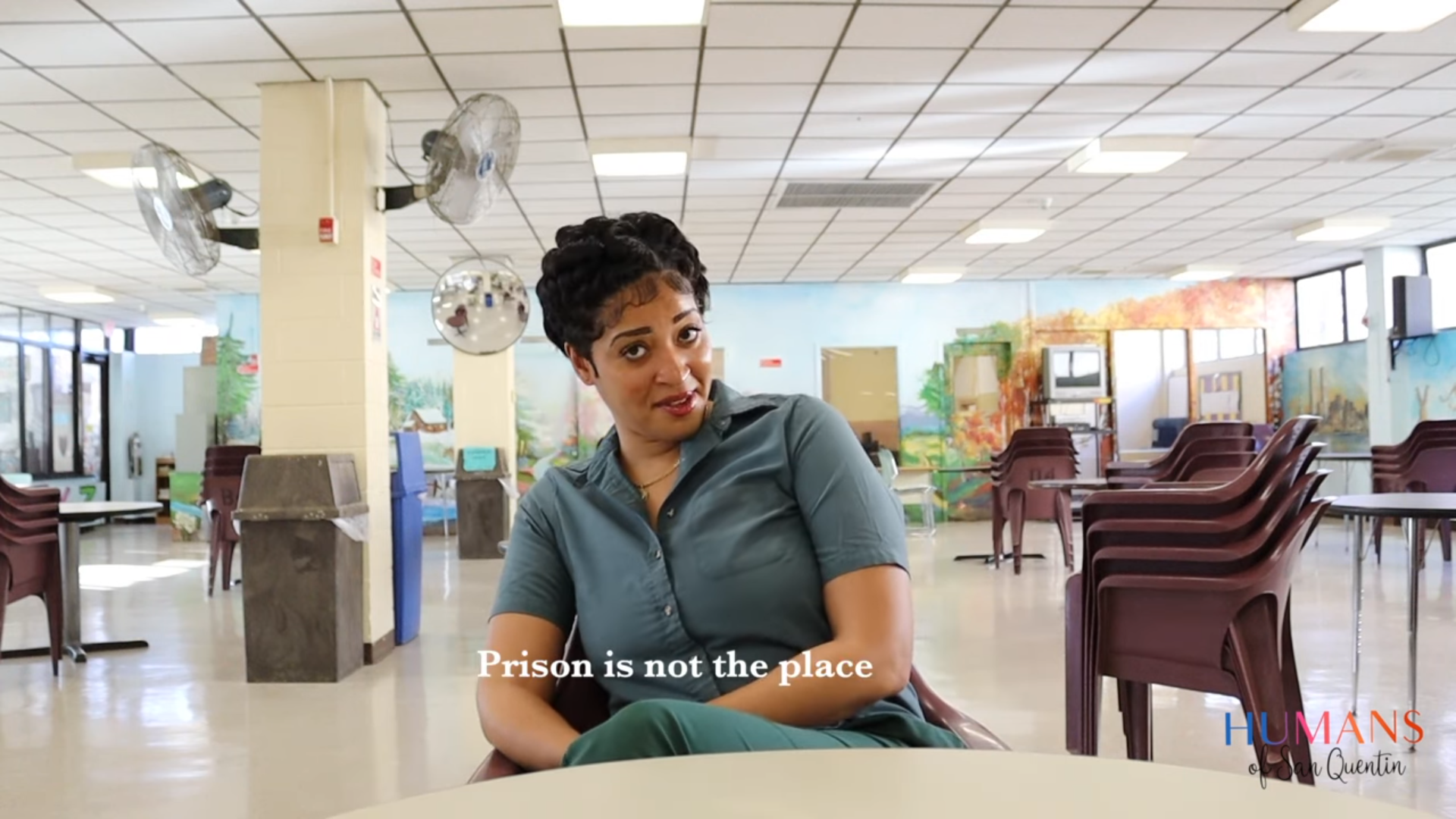
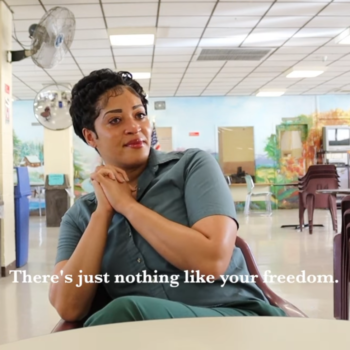
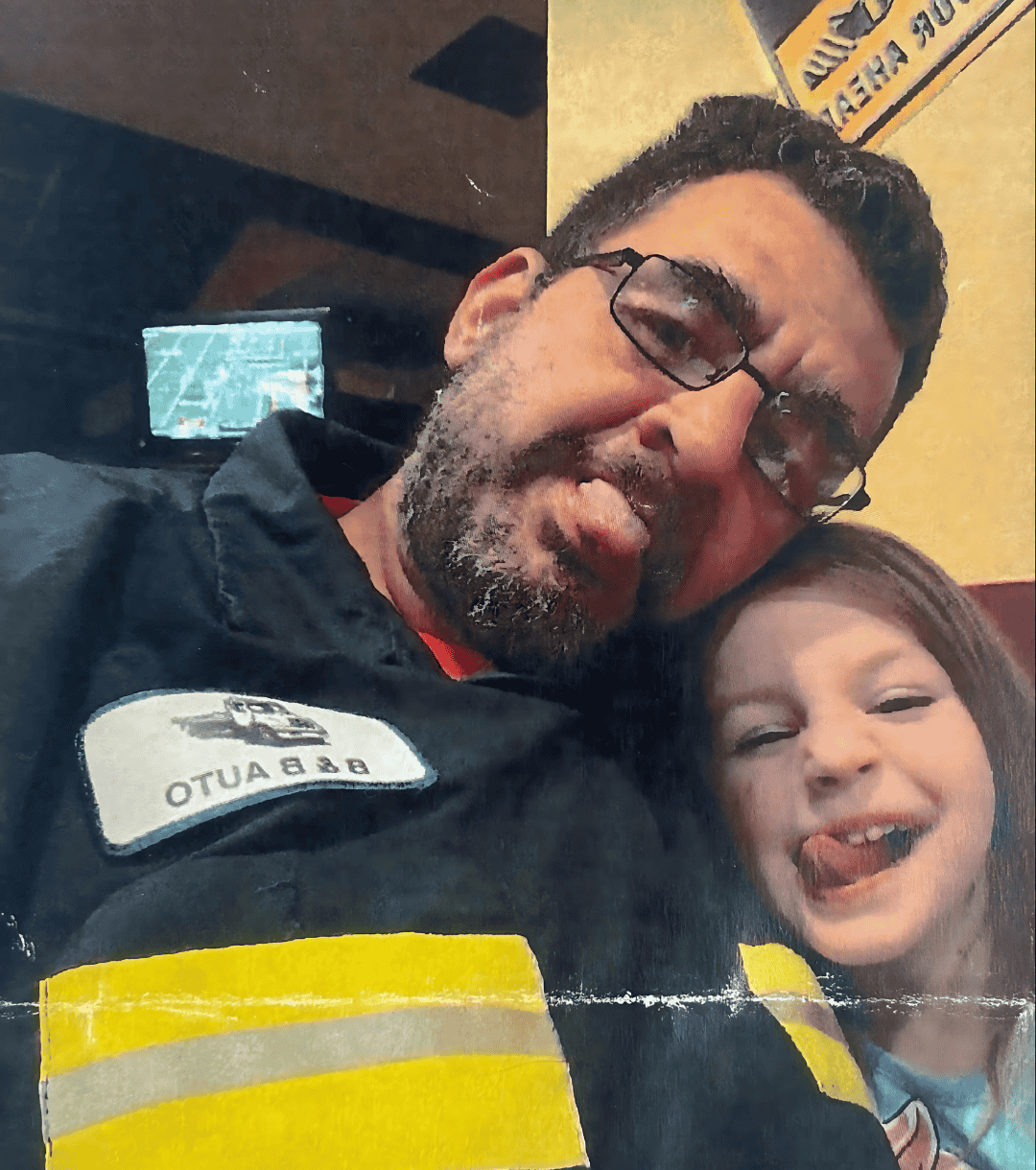
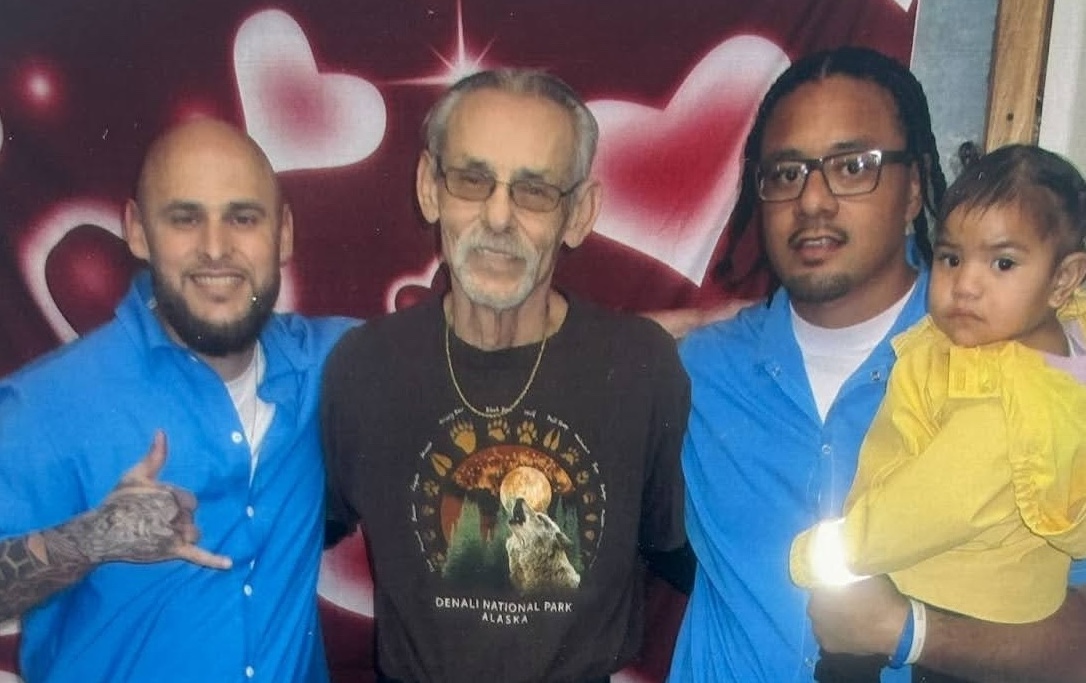
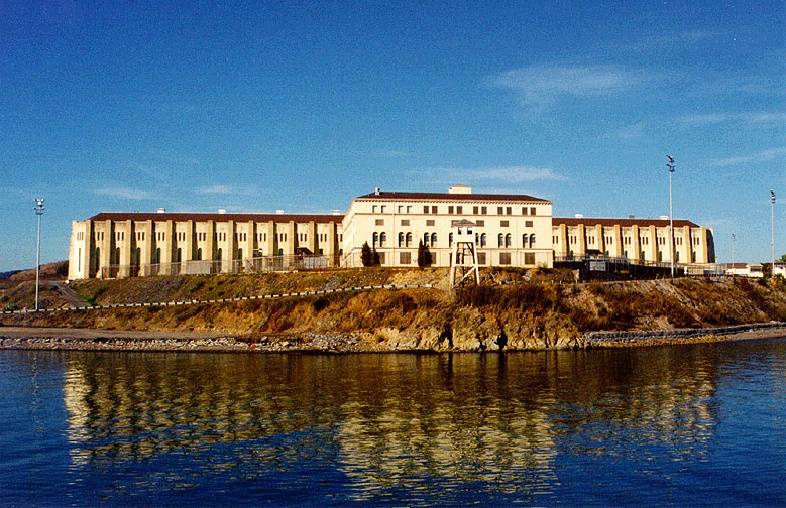
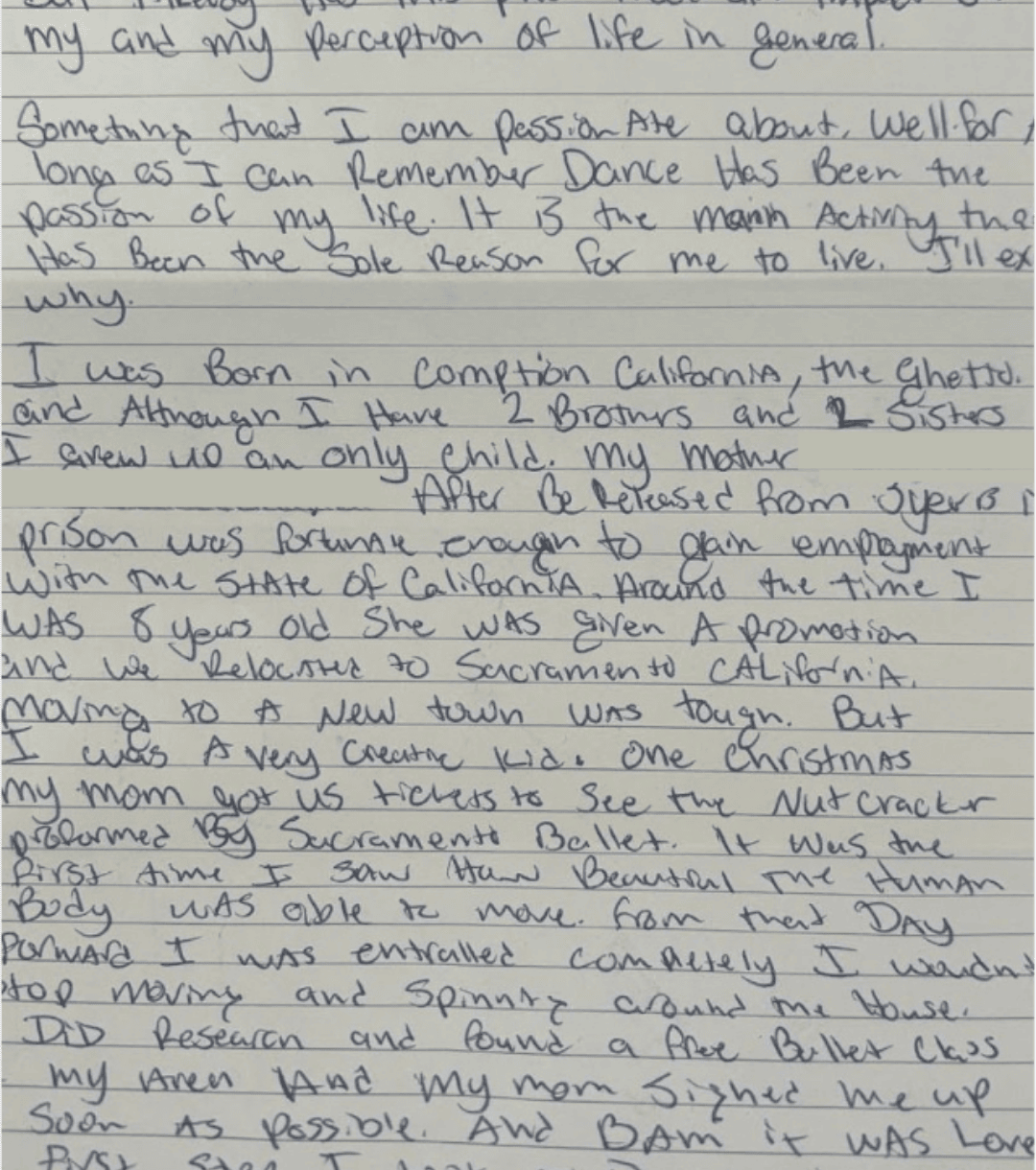

I would like to write a postal letter to Kimberly to give her words of encouragement. I hope that you will send me her name, prison ID number and address. Thank you.